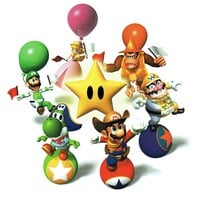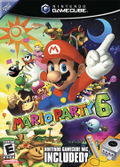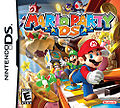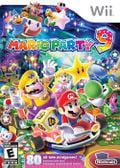Mario Party (series): Difference between revisions
mNo edit summary |
|||
| Line 387: | Line 387: | ||
|- | |- | ||
! [[Waluigi]] | ! [[Waluigi]] | ||
| || || ✔ [[#ch3|<sup>3</sup>]] || ✔ || ✔ || ✔ || ✔ || ✔ || ✔ || || ✔ || | | || || ✔ [[#ch3|<sup>3</sup>]] || ✔ || ✔ || ✔ || ✔ || ✔ || ✔ || || ✔ || ✔ | ||
|- | |- | ||
! [[Wario]] | ! [[Wario]] | ||
| Line 393: | Line 393: | ||
|- | |- | ||
! [[Yoshi]] | ! [[Yoshi]] | ||
| ✔ || ✔ || ✔ || ✔ || ✔ || ✔ || ✔ || ✔ || ✔ || ✔ || ✔ || | | ✔ || ✔ || ✔ || ✔ || ✔ || ✔ || ✔ || ✔ || ✔ || ✔ || ✔ || ✔ | ||
|} | |} | ||
Revision as of 11:10, August 31, 2013
Template:Series-infobox The Mario Party series is a virtual board game created by Hudson Soft (Mario Party to Mario Party DS) and by Nd Cube (Mario Party 9). It features a cast of prominent Mario characters, some of which have been Mario, Luigi, Peach, Yoshi, Donkey Kong, Wario and many more with each game featuring variations on the cast and storyline. The series is intended for four players, but computer controlled players may be selected as well. All of the games share similar gameplay in which the primary objective requires the player to move his or her character across the selected stage to gather a Star. Usually, the player must then pay a fee of twenty coins to the host, a non-playable character such as Toad. After each player has completed his or her turn, a minigame then begins, in which the player may be awarded coins, based on their performance. The rules have changed in Mario Party 9, where the objective is to get the most Mini-stars in boards to be the superstar.
At the end of the game, Stars and Bonus Stars will be tallied. The person with the most stars at the end of the game becomes the winner, or in this case, the Superstar. If Stars are tied between players, other statistics will be applied. These include the amount of coins collected, minigame victories, and so on.
The Mario Party series amasses eleven games, across the Nintendo 64, Nintendo GameCube, and Wii consoles, as well as the Game Boy Advance, Nintendo DS, and Nintendo 3DS. The series even sports a card game that works with the e-Reader peripheral. The cast of characters, character cameos, and minigames are numerous. Thus far, the series has been very commercially successful, and looks to continue its success.
History
| Title, Original Release and System | Synopsis and Ratings |
|---|---|
| Mario Party
|
The first game for the series was Mario Party, released in 1998 for Japan and 1999 for the rest of the world. This was the introduction of Stars and Coins in the series |
| Template:Releasedate Nintendo 64 | (Unavailable) |
| Mario Party 2
|
The second game in the series, Mario Party 2, was released in Japan in 1999 and for the rest of the public in 2000. This game introduced Items, that can be used before using a Dice Block. Players could only hold one item. Item Minigames were also introduced, where players could win an item, and is triggered by landing on an Item Space. The Item Minigame the player would get is depended by what board the player has chosen. This installment also introduced Battle and Duel Minigames into the series. The former was triggered by a Battle Space and had all the players giving in a certain amount of Coins. The winner would get the most Coins. The latter was either triggered by players landing on the same space in the last five turns, or by using a Duelling Glove. Like the Item Minigames, the Duel Games were dependent on the board that was chosen. |
| Template:Releasedate Nintendo 64 | (Unavailable) |
| Mario Party 3
|
The third game of the series, released in 2000 in Japan and in 2001 in the other regions. This is the first game in the series that had Princess Daisy and Waluigi playable (only in Party Mode), thus introducing a playable cast of eight, as opposed to a cast of 6. Item and Duel Games were no longer depended on the board they were encountered, but was chosen by the same way as the other types of Minigames. Players could hold up to three items now, as opposed to just one. This game also introduced more items to choose from. This third installment also introduced a Story Mode, where one player would go through different boards in a row while a story unfolds. This game also had Duel Boards, that had completely different rules. |
| Template:Releasedate Nintendo 64 | (Unavailable) |
| Mario Party 4
|
The fourth game of the series, Mario Party 4 was released in North America in October 21, 2002. This is the first Mario series overall to have Princess Peach and Princess Daisy in their current main dresses, as well as Princess Daisy's hair being short; also being the last Mario Party to have Donkey Kong as a main playable character, and the only Mario Party title to feature Bowser as a playable character. |
| Template:Releasedate Nintendo Gamecube | (Unavailable) |
| Mario Party 5
|
The fifth installment in the Mario Party series, Mario Party 5 was released in North America in November 10, 2003. It is the first Mario Party to have the shopping system was replaced with the new Capsule system. |
| Template:Releasedate Nintendo Gamecube | (Unavailable) |
| Mario Party 6
|
The sixth installment in the series, released in December 6, 2004. |
| Template:Releasedate Nintendo Gamecube | (Unavailable) |
| Mario Party 7
|
Mario Party 7 is the seventh home console installment in the Mario Party series, and the final installment for the Nintendo GameCube system, released in November 7, 2005. In addition, it is the first installment to include teams. |
| Template:Releasedate Nintendo Gamecube | (Unavailable) |
| Mario Party 8
|
Mario Party 8 is the eighth installment of the Mario Party series on a home console, the first Mario Party title for the Wii, and the tenth game overall in the series, which features items called Candy that can transform characters that cannot be set up as traps on boards.. |
| Template:Releasedate Wii | (Unavailable) |
| Mario Party DS
|
Mario Party DS is the eleventh installment in the Mario Party series (thirteenth in Japan), the second for the handheld consoles (the other being Mario Party Advance for the Game Boy Advance and Mario Party: Island Tour for the Nintendo 3DS), and the only one for the Nintendo DS. |
| Template:Releasedate DS | (Unavailable) |
| Mario Party 9
|
Mario Party 9 is the ninth home console installment of the Mario Party series and second for the Wii. The game was developed by Nd Cube for the first time, with Mini Stars replacing coins and Stars. |
| Template:Releasedate Wii | (Unavailable) |
| Mario Party: Island Tour
|
Mario Party: Island Tour is the thirteenth installment in the main series (seventeenth in Japan) in the Mario Party series and the third installment for a handheld console, set to be released in November 22, 2013. |
| Template:Releasedate 3DS | (Unavailable) |
Boards
The Mario Party series included many boards in various installments. Below is a list of all of them and what games they appear in.
| Theme | 1 | 2 | 3 | 4 | 5 | 6 | 7 | 8 | 9 | DS | IT |
|---|---|---|---|---|---|---|---|---|---|---|---|
| Cake | ✔ | ✔ | ? | ||||||||
| Casino | ✔ | ✔ | ✔ | ? | |||||||
| Castle | ✔ | ✔ | ✔ | ✔ | ? | ||||||
| Cavern | ✔ | ✔ | ✔ | ||||||||
| Cloudy Sky | ✔ | ✔ | ✔ | ? | |||||||
| Desert | ✔ | ✔ | ✔ | ✔ | ? | ||||||
| Factory | ✔ | ✔ | ✔ | ? | |||||||
| Forest (Non-tropical) | ✔ | ✔ | ✔ | ✔ | ✔ | ✔ | ✔ | ||||
| Horror | ✔ | ✔ | ✔ | ✔ | ? | ||||||
| Island | ✔ | ✔ | ✔ | ✔ | ✔ | ✔ | ✔ | ? | |||
| Jungle | ✔ | ✔ | ✔ | ✔ | ✔ | ? | |||||
| Library | ✔ | ? | |||||||||
| Music | ✔ | ? | |||||||||
| Park | ✔ | ✔ | ✔ | ✔ | ? | ||||||
| Peak | ✔ | ✔ | ✔ | ✔ | |||||||
| Railway (Non-roller coaster) | ✔ | ✔ | ✔ | ✔ | ? | ||||||
| Rainbow | ✔ | ✔ | ✔ | ✔ | ✔ | ✔ | |||||
| Ship | ✔ | ✔ | ✔ | ✔ | |||||||
| Snowfield | ✔ | ✔ | ? | ||||||||
| Space | ✔ | ✔ | ✔ | ✔ | ✔ | ✔ | ✔ | ||||
| Town | ✔ | ✔ | ✔ | ✔ | |||||||
| Underwater | ✔ | ✔ | ✔ | ? | |||||||
| Volcanic | ✔ | ✔ | ✔ | ✔ | ✔ | ✔ | ? |
Mario Party
- This game has 8 boards
- Cake - Peach's Birthday Cake
- Castle - Mario's Rainbow Castle
- Cloudy Sky - Mario's Rainbow Castle
- Factory - Luigi's Engine Room
- Island - Yoshi's Tropical Island
- Jungle - DK's Jungle Adventure
- Peak - Wario's Battle Canyon
- Space - Eternal Star (Unlockable)
- Volcanic - Bowser's Magma Mountain (Unlockable)
Mario Party 2
- This game has 6 boards
- Desert - Western Land, Mystery Land
- Forest (Non-tropical) - Mystery Land
- Horror - Horror Land
- Island - Pirate Land
- Park - Bowser Land (Unlockable)
- Railway (Non-roller coaster) - Western Land
- Ship - Pirate Land
- Space - Space Land
Mario Party 3
- This game has 6 boards
- Cavern - Creepy Cavern
- Desert - Spiny Desert
- Forest (Non-tropical) - Woody Woods
- Island - Waluigi's Island (Unlockable)
- Snowfield - Chilly Waters
- Underwater - Deep Bloober Sea
Mario Party 4
- This game has 6 boards
- Casino - Goomba's Greedy Gala
- Horror - Boo's Haunted Bash
- Island - Koopa's Seaside Soiree
- Jungle - Shy Guy's Jungle Jam
- Park - Toad's Midway Madness
- Railway (Non-roller coaster) - Toad's Midway Madness
- Volcanic - Bowser's Gnarly Party (Unlockable)
Mario Party 5
This game has 7 boards
- Cake - Sweet Dream
- Castle - Rainbow Dream
- Cloudy Sky - Rainbow Dream
- Park - Toy Dream
- Peak - Pirate Dream
- Ship - Pirate Dream
- Space - Future Dream
- Underwater - Undersea Dream
- Volcanic - Bowser Nightmare (Unlockable)
Mario Party 6
- This game has 9 boards (6 in party mode and 3 in solo mode)
- Castle - Clockwork Castle, Infernal Tower (Solo)
- Cloudy Sky - Clockwork Castle (Unlockable)
- Desert - Thirsty Gulch (Solo)
- Factory - E. Gadd's Garage
- Forest (Non-tropical) - Towering Treetop
- Island - Castaway Bay
- Snowfield - Snowflake Lake
- Space - Astro Avenue (Solo)
- Town - Faire Square
- Volcanic - Infernal Tower (Solo)
Mario Party 7
- This game has 6 boards
- Desert - Pyramid Park
- Forest (Non-tropical) - Windmillville
- Park - Bowser's Enchanted Inferno! (Unlockable)
- Peak - Pagoda Peak
- Ship - Grand Canal
- Town - Grand Canal, Neon Heights
- Volcanic - Bowser's Enchanted Inferno! (Unlockable)
Mario Party 8
- This game has 6 boards
- Jungle - DK's Treetop Temple
- Island - Goomba's Booty Boardwalk
- Horror - King Boo's Haunted Hideaway
- Railway (Non-roller coaster) - Shy Guy's Perplex Express
- Space - Bowser's Warped Orbit (Unlockable)
- Town - Koopa's Tycoon Town
Mario Party 9
- This game has 7 boards
- Castle - Boo's Horror Castle
- Casino - Bowser Station (Unlockable)
- Cavern - Magma Mine
- Factory - Bob-omb Factory
- Forest (Non-tropical) - Toad Road
- Horror - Boo's Horror Castle
- Island - Blooper Beach
- Jungle - DK's Jungle Ruins (Unlockable)
- Railway (Non-roller coaster) - Magma Mine
- Space - Bowser Station (Unlockable)
- Underwater - Blooper Beach
- Volcanic - Magma Mine
Mario Party DS
- This game has 5 boards
- Casino - Bowser's Pinball Machine (Unlockable)
- Forest (Non-tropical) - Wiggler's Garden
- Jungle - DK's Stone Statue
- Library - Kamek's Library
- Music - Toadette's Music Room
Playable Characters
Playable characters are introduced in the first Mario Party. During the first two Mario Party games, Mario, Luigi, Princess Peach, Wario, Yoshi, and Donkey Kong are the only playable characters in the series. Starting in Mario Party 3, the game introduces new playable characters in debut, the new playable characters are only playable in the Party Mode; the previous new characters that appear in the next game are now playable in the Story Mode. There are some exceptions in games like Mario Party Advance and Mario Party DS do not introduce new characters.
There are some exceptions of removing playable characters in later games; Donkey Kong is removed starting in Mario Party 5 because he now owns a space called a DK Space which he hosts, although Donkey Kong is playable in the Special Duel Mode in Mario Party 5. Another playable character named Koopa Kid (Mini Bowser in PAL regions) appeared in Mario Party 5 and Mario Party 6; he was removed after the last appearance because he now owns a space called the Koopa Kid Space. In Mario Party 9, Boo, Dry Bones, Blooper, and Hammer Bro were removed and given supporting roles. Toadette was also removed, and was completely absent from the game.
In the game Beach Volley Folley that appeared in Mario Party 4 and then Mario Party 5, there are exceptionally playable characters that can not be played as on the normal boards but are able to participate in this game.
The Mario Party series included many characters in various installments. Below is a list of all of them and what games they appear in.
| Character | 1 | 2 | 3 | 4 | 5 | 6 | 7 | 8 | 9 | A | DS | IT |
|---|---|---|---|---|---|---|---|---|---|---|---|---|
| Birdo | ✔ | ✔ | ✔ | ? | ||||||||
| Blooper | ✔ | ? | ||||||||||
| Boo | ✔ 1 | ✔ 3 | ✔ | ✔ | ✔ | ? | ||||||
| Bowser | ✔ 1 | ? | ||||||||||
| Daisy | ✔ 3 | ✔ | ✔ | ✔ | ✔ | ✔ | ✔ | ✔ | ✔ | |||
| Donkey Kong | ✔ | ✔ | ✔ | ✔ | ✔ 2 | ? | ||||||
| Dry Bones | ✔ | ✔ | ? | |||||||||
| Hammer Bro. | ✔ | ? | ||||||||||
| Kamek | ✔ 3 | ? | ||||||||||
| Koopa Kid | ✔ 1 | ✔ 3 | ✔ | ? | ||||||||
| Koopa Troopa | ✔ 1 | ✔ | ? | |||||||||
| Luigi | ✔ | ✔ | ✔ | ✔ | ✔ | ✔ | ✔ | ✔ | ✔ | ✔ | ✔ | ✔ |
| Mario | ✔ | ✔ | ✔ | ✔ | ✔ | ✔ | ✔ | ✔ | ✔ | ✔ | ✔ | ✔ |
| Mii | ✔ 4 | ? | ||||||||||
| Princess Peach | ✔ | ✔ | ✔ | ✔ | ✔ | ✔ | ✔ | ✔ | ✔ | ✔ | ✔ | ✔ |
| Shy Guy | ✔ 1 | ✔ 3 | ? | |||||||||
| Toad | ✔ 1 | ✔ 3 | ✔ | ✔ | ✔ | ✔ | ✔ | ✔ | ||||
| Toadette | ✔ | ✔ | ✔ | ? | ||||||||
| Waluigi | ✔ 3 | ✔ | ✔ | ✔ | ✔ | ✔ | ✔ | ✔ | ✔ | |||
| Wario | ✔ | ✔ | ✔ | ✔ | ✔ | ✔ | ✔ | ✔ | ✔ | ✔ | ✔ | |
| Yoshi | ✔ | ✔ | ✔ | ✔ | ✔ | ✔ | ✔ | ✔ | ✔ | ✔ | ✔ | ✔ |
- ✔ – Playable character
- Blank space – Non-playable character
- ? – characters yet to be announced to confirm or deny in the future Mario Party Series.
- 1 — The character is playable only in Beach Volley Folley.
- 2 — The character is playable only in the Special Duel Mode in the game.
- 3 — The character is playable only in the Party Mode in the game.
- 4 — The character is playable only in the Extra Mode.
Hosts
These characters lead each individual Mario Party game.
- Mario Party: Toad and Koopa Troopa
- Mario Party 2: Toad and Koopa Kid (only in Bowser Land)
- Mario Party 3: Tumble
- Mario Party 4: Toad, Shy Guy, Boo, Koopa Troopa, Goomba and Koopa Kid
- Mario Party 5: Star Spirits
- Mario Party 6: Brighton & Twila
- Mario Party 7: Toadsworth
- Mario Party 8: MC Ballyhoo & Big Top
- Mario Party 9: Yellow Toad and Blue Toad
- Mario Party Advance: Toad, Toadette, Tumble, and E. Gadd
- Mario Party DS is the first and currently only game in the series to not have any visual host.
- Mario Party: Island Tour: Yellow Toad, others are unknown
Spaces
- Main article: Space (Mario Party series)
All the spaces in the Mario Party games.
Items
Every item, capsule, orb, candy, and hex from the series.
List of All Minigames
The Mario Party series' popularity is due in no small part to its minigames. Throughout the series' nine console titles, the list of minigames has become tremendous. Below is a list of all 769 minigames, separated by game. The minigames' titles generally rhyme, use alliteration, or are puns of popular phrases.
Awards
- Longest Running Mini-Game Series - Guinness Book of World Records Gamer's Edition 2009 - 2013
Trivia
- Luigi mentions the Mario Party series in his diary in the events of Paper Mario.
- The Mario Party games are mentioned in one of the Coin Block/Brick Block cards in Nintendo Monopoly. Here, the player gets $50 from every player for organizing a Mario Party in the 2006 version, and $10 in the 2010 version.
- Mario, Luigi, Princess Peach, and Yoshi are the only characters to be playable in every Mario Party game.
- Koopa Kid has appeared in every Mario Party game, except since Mario Party 8. He went by the name of Baby Bowser in Mario Party 1, 2 and 3. He was replaced by Bowser Jr. in Mario Party 9 and Mario Party DS and never appeared at all in Mario Party 8.
- Goomba is the only host in Mario Party 4 who hasn't been playable in a later game. Toad was playable in Mario Party 5, Boo was also playable in Mario Party 5, Shy Guy was playable in Mario Party 9, and Koopa was also playable in Mario Party 9.
- Mario Party: Island Tour is the only non-arcade installment in the series to not be named with a number or after the console it's for.



